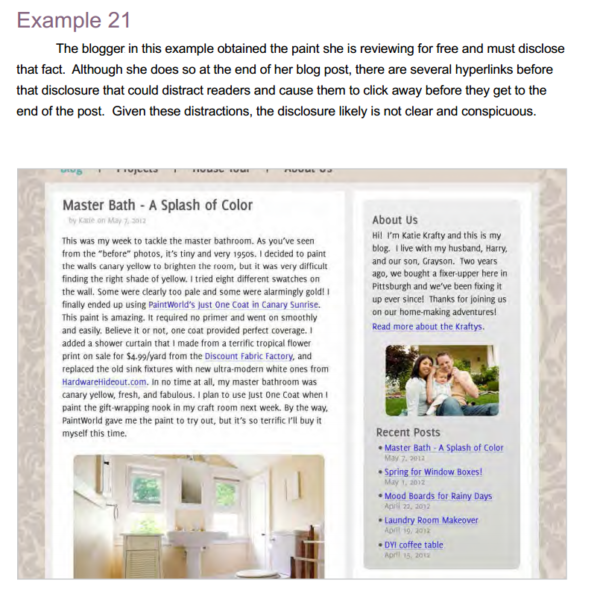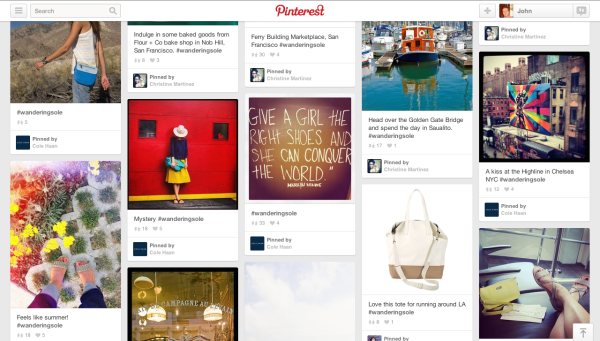
Using your fans to help you generate content for your website and social media can be a great tactic to show your business’s impact and save you time.
But if you’re going to use “user-generated content,” you’ll want to know the rules for doing so, so you can share your fans’ content without having to worry about things like:
- Is it legally correct for me to ask my customers to do this?
- Is it ethically ok to ask them to create content?
- Can I give out free products or even money to thank them?
The short answer is: YES! It’s ok to get your fans to help you by writing blog posts, adding product reviews, and sharing updates on social media.
The long answer, however, is that you want to make sure you’re following all the rules and guidelines as stated by the Federal Trade Commission (FTC).
Although the FTC does not monitor blogs, websites, or social platforms, they do field tons of consumer complaints each day about inaccuracy in advertising — and some of these claims are related to user-generated content.
Here are 6 simple rules to remember so that you can correctly use the great and authentic content your customers create for you.
1. If your customers are being paid in any way, they should disclose it.
Oftentimes, when you’re asking customers to share or create content for you, you’re not paying them monetarily and so you don’t have to worry about this rule. If you are paying a fan to write a review or create a blog post about your new service, on the other hand, this must be disclosed.
You always want to make sure there is no gray area around a customer authentically sharing content on your behalf and someone you have hired to create content.
You can most certainly pay customers or fans to create content; it just needs to be stated clearly that the customer is being paid for writing the particular piece of content. More on appropriate disclosures below.
2. If your customers receive something for free and are writing/sharing about it, they should disclose it.
The FTC guidelines spend a lot of time talking about this. This use case often applies to a blogger writing a post or a customer writing a review. If a blogger is reviewing a product she received for free, she should clearly note it, preferably at the beginning of the blog post itself. BlogHer also recommends that if possible, the blogger should provide additional detail at the bottom of the blog post itself.

(Image: BlogHer)
3. If a share has been paid for, it should be disclosed.
Ok, you get the point. If money has been shelled out, it should be disclosed. There are clear guidelines around how you can disclose this fact, which will be helpful if you need to figure out how you include the details about a tweet being paid for within those 140 characters.
While in the past, brands would often use a hashtag to disclose that a tweet or post was an ad, this is actually not necessary in the new guidelines. It is much more important that the intent of the post is clear, which can be done just as easily by including the word “Ad” or “Sponsored.”
What is most important is that the intent is clearly stated and not hidden in some hyperlink or disclosure elsewhere. The disclosure also needs to be included in every tweet/post. Check out some more specific guidelines here.
4. Disclosures must be clear and conspicuous.
Whether the content is shown on a desktop computer, mobile phone, on Facebook, or on your website, any disclosure should be clear and easy to find.
All disclosures should be:
- Proximate to the information so the consumer does not have to hunt for it
- Of at least the same size as the message
- In the same format as the message
- Accessible on all platforms used
- Understandable to the consumer
5. The company is responsible for this content, not the fans sharing it.
I know, this sounds a little nerve-wracking. Remember, this only applies if you’re paying fans to share for you. You do not have to worry about this stipulation when fans are just sharing content you asked them to or creating content on your behalf.
A helpful example to look at is shoe retailer Cole Haan. They created a Pinterest contest with plans to incentivize the best photos on Pinterest with a $1,000 prize. The FTC ruled that Cole Haan should have told fans to appropriately note that they were sharing as part of this contest. There was no issue in running the promotion itself, just in the disclosure.
If you’re unsure, it’s always best to play on the safe side and just ask fans to disclose.

Image: Digiday, How To Avoid Legal Problems on Pinterest
6. Check in on a case-by-case basis.
There are a lot of cases that still exist where you’re unsure as to how you should disclose something. For example, what if a customer received a free product at some point and then decides to share something about the product on their Facebook Page later on?
Keep in mind, if you decide to run a big contest or ask your fans to create content attached to a prize, you might want to check with a lawyer first instead of getting yourself into hot water later on.
The FTC also recognizes that there is a lot of gray area, and with technology constantly changing, it can be difficult for it to keep up with all the marketing news updates. Do your best to nail down the basics, and seek help if you’re unsure about specific situations.
User-generated content can be a beautiful thing.
It can be free or inexpensive, it’s authentic, and it can generate powerful new exposure for your business. Before taking the plunge, however, make sure you know the basic rules and guidelines, so this content provides nothing but positive word-of-mouth about your company!
Disclaimer: I am not a lawyer and do not claim to be one, so this article is meant to be informational and does not include legal advice. Always check with a lawyer first if you’re uncertain on anything.
Ali Hyatt leads marketing and product for Upward Labs, which creates software for businesses to build and manage brand ambassador programs to drive customer engagement and increase revenue and reach. Upward Labs is a former resident inConstant Contact’s Small Business Innovation Loft. Read her previous posts here.




